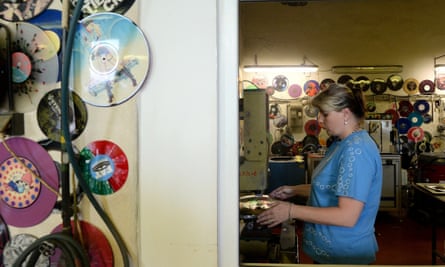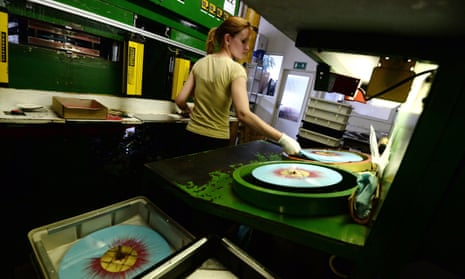All Zdeněk Pelc wanted, as record sales succumbed to the hi-tech onslaught of the digital age, was to head Europe’s final vinyl production factory.
Now the ambition to be last man standing where others have fallen has bloomed into an unlikely business success that would have been unimaginable when his once old-fashioned plant was the heart of the former communist Czechoslovakia’s state-run record industry.
From the rustic setting of Loděnice – an unprepossessing village of 1,640 people in the Czech Republic’s Bohemian hills, 16 miles south of Prague – Pelc’s company, GZ Media, has become the global leader fuelling an unforeseen revival of vinyl records.
A product once regarded as a relic of a bygone era has made an unexpected comeback, thanks partly to the doggedness of Pelc, 65, who could not bear to preside over the death of vinyl even when it appeared obsolete.
“In 1995, I was not a visionary,” he says. Twelve years earlier, the communist authorities had appointed him chief executive of Gramofonové Závody Loděnice because no one else could be found.
“But I decided then that we would keep production running even though we were producing only a small number of records so that we would be the last vinyl company in Europe.”

His reasons were partly emotional. After a year during which he slept in his office because lack of transport prevented him commuting daily to his home nearly 20 miles away, he grew attached to vinyl production.
“Vinyl had become part of my life,” says Pelc, now president of the company he bought out from a US investor who purchased it after the fall of communism in 1989.
After years in which first CDs and then online streaming services seemed to have consigned them to history, LP sales in the US soared to more than 9.2m in 2014. In Britain, where growth has prompted the introduction of vinyl-only charts, sales reached 1.3m, the highest in 20 years.
With upward trends continuing, GZ Media will produce 25m records this year, a 40% increase on 2015 figures.
That is far more than rival companies in Germany and the US. The firm’s success recently prompted it to buy a vinyl plant in Memphis, Tennessee, and open a new one on a green field site near Toronto.
GZ now has exclusive rights to produce vinyl versions of the back catalogue of the Rolling Stones, U2 and a host of others. It also churns out albums by current stars such as Justin Bieber and Lady Gaga. Last year’s biggest production was Amy Winehouse’s Back to Black.
The company’s competitive edge has been boosted by Pelc’s decision in 2005 to invest in new presses to meet what was then a modest growth in vinyl sales, putting the firm in pole position to exploit the explosion in demand first seen in 2012 and 2013.
The success is evident from the rapid expansion of a plant that was formerly a textile mill and which, during the second world war, was converted by the Nazi occupation force into a factory producing parts for V1 and V2 rockets, Hitler’s so-called wonder weapon, which inflicted severe damage on Britain and other countries.

From 500 employees in communist times, the company – which also has a packaging division – now has 2,000 workers, 400 of them in the music division that a decade ago employed just 50 people.
For Pelc, GZ’s journey from state enterprise to global market leader worth an estimated $100m (£76m) has encompassed a parallel personal transition.
On his desk sits the cover of the Rolling Stones’ 1971 Sticky Fingers album. The disc lies on a nearby turntable. Both record and sleeve are produced on site – a symbolic change given it was one of many western records prohibited under the communist regime and available only on the black market.
“No way could I have imagined this,” he says. “No one could have predicted that the regime would fall. There were things about the system that you can only laugh about now.
“You could make $7m profit as a company, but you would have to give it all to the government. Then if you needed to invest, say, $300,000 you would have to go begging on your knees. As CEO, I was 38th on the company salary list. All the maintenance workers earned more. Looking back, it feels like a bad dream.”
Giddiness at the transformation ushered in by the rebirth of vinyl is shared elsewhere in the company.
“The return of vinyl has surprised me,” says Michal Sterba, GZ’s chief executive, explaining how he initially pushed the firm to diversify into packaging after joining in 2002. “I’m not a specific lover of music, but I have gained a passion for vinyl. It’s a unique and beautiful product.”
Cutting grooves on to a disc with a diamond stylus at a lathe machine, Vojen Svoboda, 69, a mastering engineer who has worked at the company since 1971, once thought he would be one of the last workers to produce vinyl.
“I experienced the birth of music cassettes, and at that time I thought I was seeing almost the death of vinyl,” he says. “I thought I detected a growth of interest again 15 years ago, but the demand we’re seeing now is crazy. It’s totally unexpected.”




Comments (…)
Sign in or create your Guardian account to join the discussion